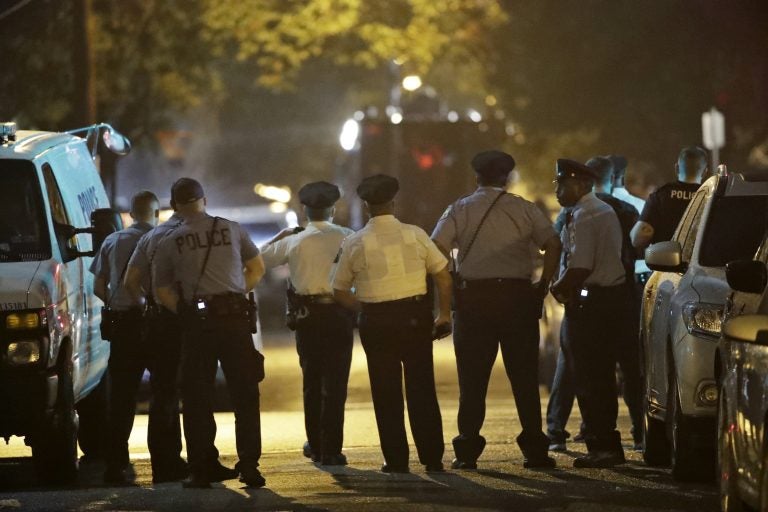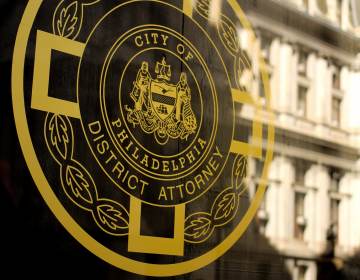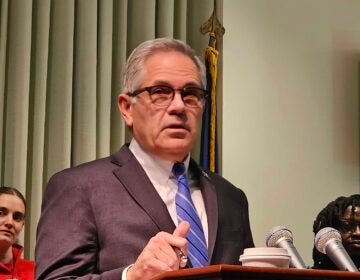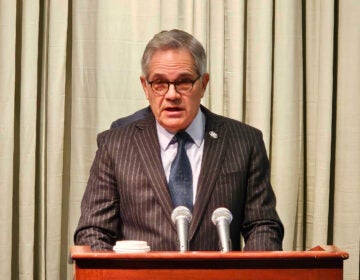Alleged police shooter’s lawyer called — and DA Larry Krasner picked up
Krasner’s involvement in the North Philly hostage negotiation was unusual. Several people, including a Trump appointee, have raised questions about his involvement.

Policer officers watch as a gunman is apprehended following a standoff Wednesday, Aug. 14, 2019, in Philadelphia. (AP Photo/Matt Rourke)
Philadelphia District Attorney Larry Krasner’s cell phone rang around 9 p.m. Wednesday night. The call was from Shaka Johnson, a defense attorney Krasner knew from his own days working criminal cases before he became DA.
Krasner missed the call, but quickly called back –– he hadn’t heard from Johnson in nearly two years. More importantly, at that moment, there was a police standoff that had seen six cops wounded and an enraged gunman holed up inside a North Philadelphia rowhome.
“Things were in such a state, I immediately realized that it was possible that the defense attorney might want to reach me for a reason having to do with the developing situation,” Krasner said Thursday.
Indeed, Johnson was the attorney for the alleged shooter, Maurice Hill. The gunman had by then fired hundreds of rounds into the street and was encircled by hundreds of police and SWAT teams. At the time the phone rang, Krasner believed several narcotics officers and detainees were still in the building –– the product of a botched warrant service that had triggered the standoff.
But Hill was ready to talk, so Johnson conferenced him in.
Soon, all three men were on the phone together. A dangerous suspect had gotten a direct line to the city’s top prosecutor.
“He was concerned he was going to be killed if he came out. And [he had] concerns about what was going to happen to him if he came out in the future, in terms of any possible case,” Krasner recounted. “Hill, at that time, in my opinion, was in a very animated, excited, frankly, dangerous state.”
But Krasner, by his own admission, is no hostage negotiator. The DA tried to calm Hill down, but it was clear that the police needed to be involved. Krasner hung up and another call was made. Soon, Philadelphia Police Commissioner Richard Ross was on the phone with Hill, Krasner and Johnson.
Ross had never before negotiated with an armed gunman. Veteran Philly PD and Department of Alcohol Tobacco and Firearms Detective Tim Brooks, he said, made up for the learning curve, “feeding him lines” to help move negotiations along.
“People [were] just trying to appeal to him about why he even had a reason to live … talking about his daughter significantly … there was a newborn,” Ross said.
What exactly was said on that four-man call remains between them.
Krasner refuses to discuss any details about the content of the calls themselves, particularly if any offers of leniency were made.
“The details of the conversation that the DA and the police commissioner had are not anything we will be discussing because this is an ongoing investigation,” said spokesman Cameron Kline, later in the day.
Whatever was said, the call ended with no definite resolution. Johnson called Krasner again. He thought he could get out Hill to come out peacefully. But he wanted to see Krasner on the street. It was an extraordinary request, but it was also an extraordinary night. Soon, Krasner, with a police escort, was heading towards 15th Street and Erie Avenue, the site of shootings.
“They kept us off the block but we were nearby,” Krasner said. “Mr. Johnson was on the phone, on speaker, with Maurice Hill as he exited that property.”
But the calls, while a dramatic detail, may have had little to do with the conclusion of the standoff.
A police source indicated that the shooter had made some more extraordinary demands, even asking to meet with U.S. Attorney William McSwain. Others said Ross had grown impatient with a standoff that dragged on for seven hours.
In the final moments, police fired tear gas canisters to force Hill out of the building and onto the ground, unharmed.
“It was the tear gas that ultimately brought him outside,” Ross said Thursday.
Krasner’s involvement in the negotiation was unusual. Several people, including McSwain, a Trump appointee, have raised questions about the controversial DA’s involvement.
But Krasner took no credit for ending the crisis, attributing its resolution to “brilliant police work” and a “miracle.”
The DA shrugged off queries about whether it was proper for him to have briefly taken part in what he described as initially appearing to be a hostage negotiation with an armed gunman. He credited the extreme circumstances of an incident that had, for a time, paralyzed the city.
“Was it what I was hoping for? No,” Krasner said. “I don’t think the commissioner was hoping to talk to this man, either. There are certain rules of engagement that are ordinary, but they’re not always right. And, in some ways, the outcome here was pretty good.”
WHYY is your source for fact-based, in-depth journalism and information. As a nonprofit organization, we rely on financial support from readers like you. Please give today.





